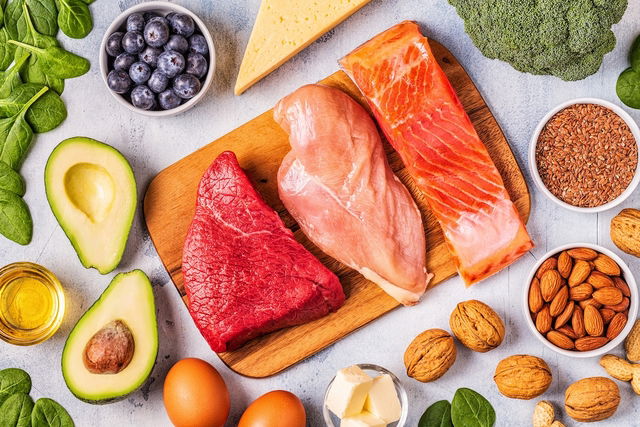Protein sources from animal products, like meat, fish, eggs, milk, cheese, and yogurt. tend to be higher in protein in comparison to plant-based sources of protein. In addition to having higher protein content, the type of protein found in animal-based food is also of high biological value, as these proteins are better quality and are more readily available to be absorbed by the body.
Plant-based foods that are high in protein include legumes, like peas, soy, and grains. Legumes have great quantities of protein, and they can be added in a balanced diet to promote optimal functioning of the body. High-protein plant-based foods are staples in vegetarian and vegan diets.
Protein is essential for many mechanisms within the body, such as cellular growth, repair, and maintenance of muscles, tissues, and organs, as well as hormone production.

Animal protein sources
The following table indicates the quantity of protein per 100 grams of the listed food:
Protein intake after physical activity is important as it helps to prevent lesions and helps muscle recovery and growth.
Plant-based protein sources
It is especially important to incorporate high-protein vegetables into vegetarian diets in order to ensure the adequate intake of amino acids. This helps to maintain muscle, cell, and hormone production. Check-out the following table to see which plant-based food sources contain high amounts of protein:
How to enhance absorption of plant-based protein
For those on a vegetarian or vegan diet, in order to ensure adequate intake of high-quality protein, high-protein plant sources should be combined with foods that promote absorption of protein in the digestive system. Some examples of food combinations are:
- Rice and beans (any type)
- Peas and corn seeds
- Lentils and buckwheat
- Quinoa and corn
- Brown rice and red beans
These food combinations and a varied diet are important to maintain the body’s growth and proper functioning in those who do not ingest animal protein. In the case of lacto-ovo vegetarians, their diets can additionally include protein that comes from eggs, milk, and other dairy products.
Achieving a high-protein diet
When attempting to consume a high-protein diet, you are advised ot have 1.1 to 1.5 grams of protein for every kilogram of body weight per day. The exact quantity that needs to consumed should be calculated by a registered dietitian, as recommended protein amounts will vary from person to person. Your adequate amount depends on your age, gender, physical activity, health history and your current health status.
Also recommended: High Protein Diet: What to Eat & Avoid (with 1-Week Meal Plan) tuasaude.com/en/high-protein-dietThis diet is advised for weight loss and muscle gain, and can especially be effective when combined with exercises that promote muscle hypertrophy. Check out our tips for gaining muscle and see which exercises you should be performing.
Are there foods that are rich in protein but low in fat?
All plant-based foods (except for nuts) mentioned in the table above are rich in protein and low in fat. On the other hand, animal-based foods that are low in fat and rich in protein can include low-fat meat like chicken breast (skinless), egg whites, and low-fat fish, like cod fish.
